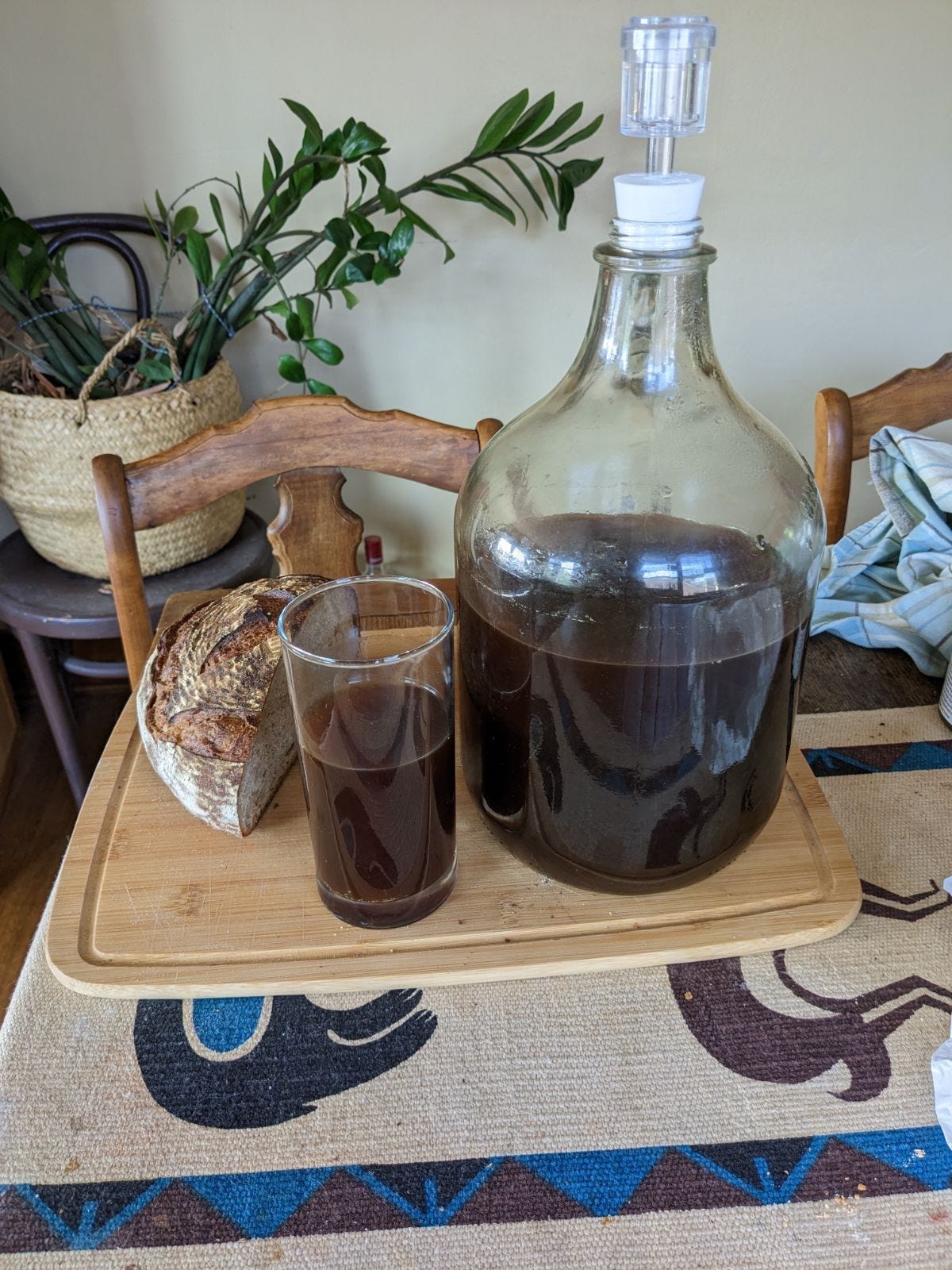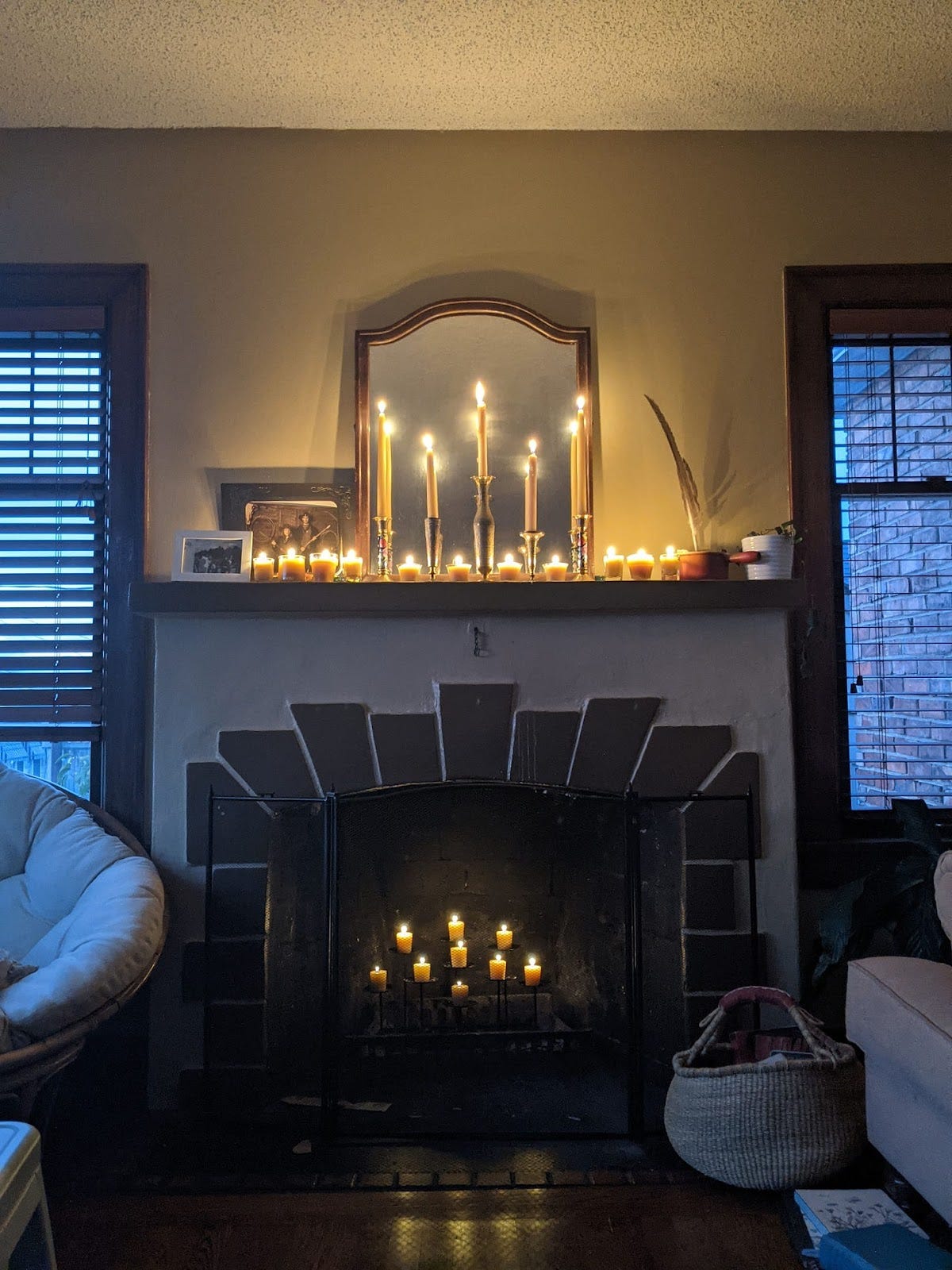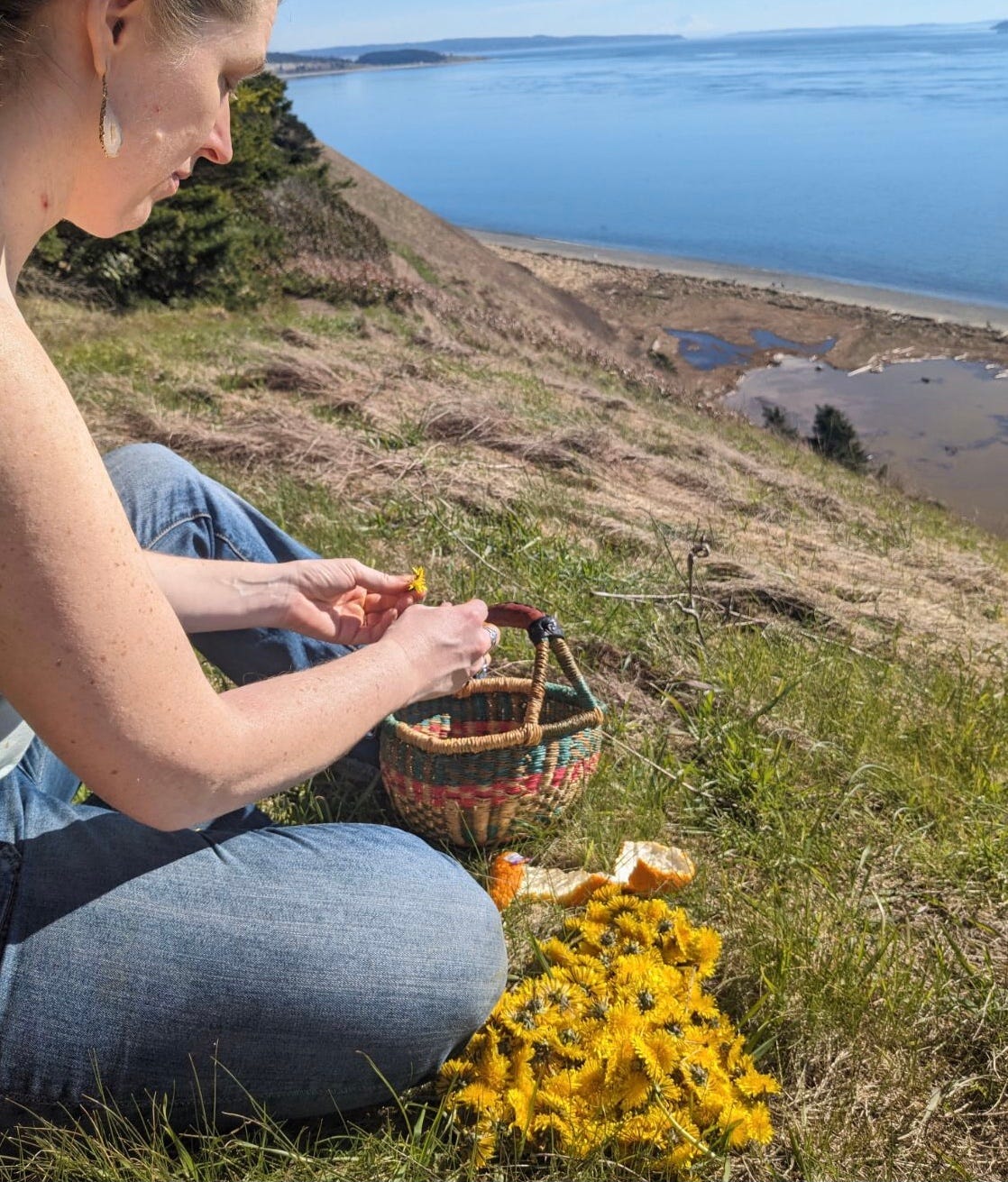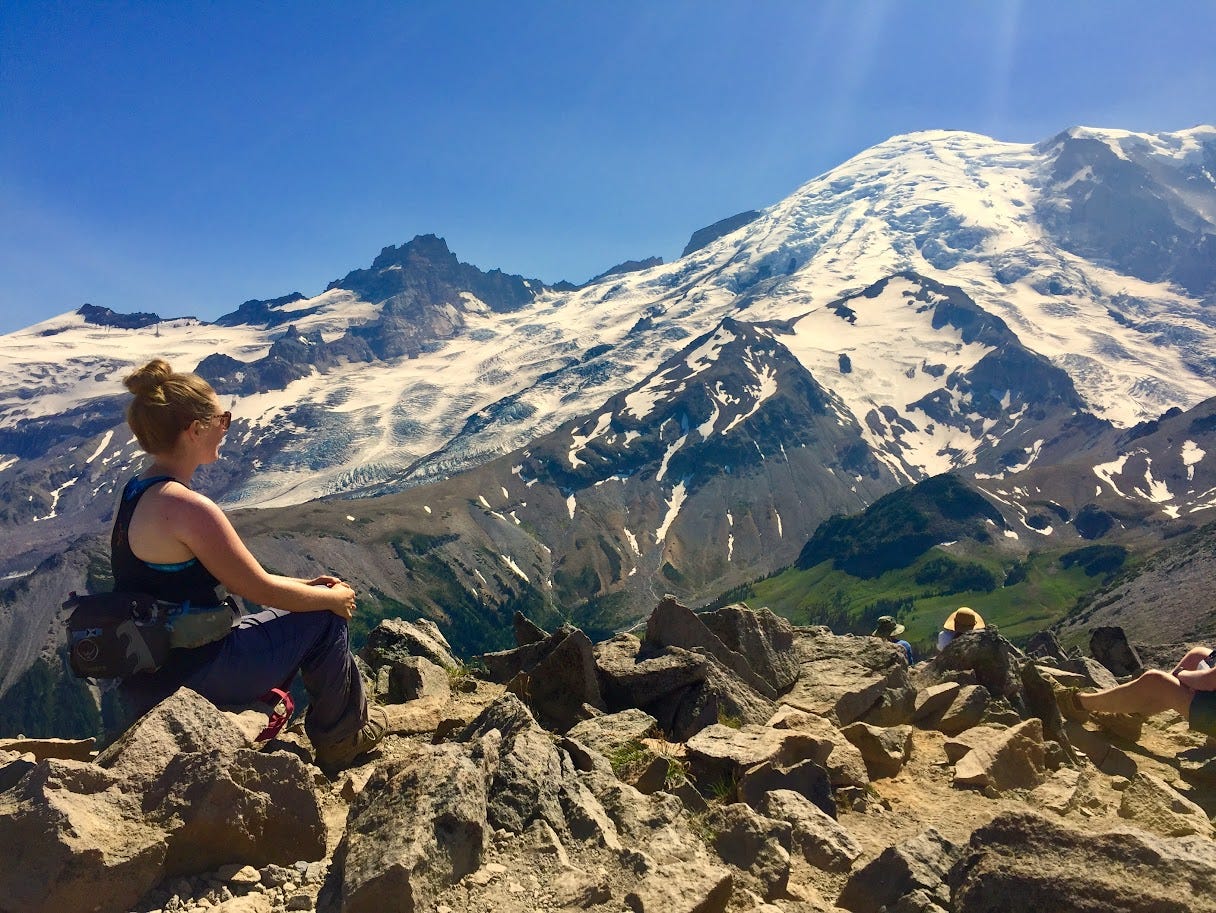By
fromMy husband and I were negotiating our way down an alpine steep when we crossed paths with a hiker, clad in high-tech trendy clothing, who stopped and asked, “How much farther to the top?” We pointed upwards beyond the bend behind us; he asked us about the view. We revealed that we didn’t reach the top because we got distracted by the very reason we had come there—huckleberries! “The huckleberries at the top are the best! They’re so ripe and abundant,” we gushed. Our enthusiasm infected him with curiosity.
We planned this alpine vacation around the huckleberry season (something nobody else on the trail seemed to do). Indeed, most other hikers did not even notice the edible huckleberry-filled scenery. They hastily trekked to the vista while we visibly stuffed our mouths and buckets with these heavenly treats. Wild huckleberries are common, yet they’re impossible to harvest commercially. Their location makes them demanding to attain, and the berries are arduous to pick. Consequently, they cost $20 per pound.
We let the hiker try some berries. When their intense sweetness assaulted his tongue, his face contorted into wordless delight. “Wow!” he exclaimed, asking us where and how to find the plant. I identified an unripe huckleberry plant nearby, explaining that the berries tend to hide underneath the leaves. He thanked us as we joyfully parted ways.
We could have revealed much more to the hiker—the secrets of the Kingdom—which show themselves in plain sight to seekers. Secrets like the sweetness in wild glacial water that grows roots that will shoot sunwards into daisies. Eventually, this living water spawns salmon in the cool mountain streams before throwing itself into the vast ocean. Secrets like the wild thimbleberries that crunch and pop with flavors of almond, jammy raspberry, and crimson-staining cherries. Or, the potent medicine in pasqueflower, mugwort, and yarrow that permits one to bypass visiting a physician for a costly prescription—the healing is in the mountains.
Wild food—one of the many wonders in the homemade life.
I didn’t always lead a homemade life. Regrettably, I’ve spent most of my days living the purchased life.
The shift began with the multitude of changes brought by the covid lockdowns. My work dried up, leaving me hours of free time. I canceled my April hiking vacation to Utah and decided to vacation at home. I packed a lunch, tied on my hiking shoes, and ventured on daily 8-mile walks around my neighborhood. With new eyes, I saw the life that was there all along. On the trees, tiny carmine buds emerged, eventually ballooning into wide, lush maple leaves. Golden sunbursts of dandelions pierced through the soccer field. When the flowers turned to puffs of seeds and their limp bodies fell back into earth, white clover emerged along with the whirr of buzzing bees. For the first time, I noticed the verdancy of the foliage awakening in the throbbing pulse of that Spring of 2020. My childlike perception returned as I walked in awestruck wonder, hearing the songbirds and seeing the novelty of Creation as if for the very first time. Yet, in my newfound wonder, I felt a deep heaviness. A profound sadness.
I had not realized the great emptiness I had been living in for so long.
I had wasted my life focusing on human-made things rather than Creator-created Creation. And the human-made world did not evoke the satisfying wonder I was just now beginning to grasp.
I was trained up to live the purchased life. I lived this life at universities and in front of computer screens while binge-watching shows, eating fried food at cheap happy hours, commuting on the freeway, and flying to exotic destinations while stuffing down packaged purchased food. My MacBook laptop, Kindle, and smartphone were ever available for me to listen to podcasts or just scroll the IG. As a weekend warrior I frequented concerts, shows, movies, and restaurants. There was no time to consider the lilies, so I didn’t!
Covid lockdown granted me an abundance of time, I smelled the roses on my long walks. And ate them too! I simmered their rose hips into jam and steeped their petals into calming tea. While learning other plants, I began to cautiously nibble my way through the neighborhood. I roasted dandelions into a soothing digestif. I trimmed elderberry bunches to cook into elderberry syrup. I plucked spruce tips for making jelly. I collected cottonwood buds to make Balm of Gilead—an analgesic anointing oil. In doing this, I learned that gathering from God’s garden is a way to materially receive His spiritual gifts without much toil on my end. It says in Philippians (4:19), God will sustain me: “My God shall supply all your need.” God’s love was no longer abstract or theoretical but physical—tangible—in the freely given dandelions, elderberries, and healing cottonwood buds.
The ponderous days in 2020 halted my “busyness.” And I realized I liked it. I did not miss flying, traveling, or commuting. Nor did I miss restaurants, packaged food, concerts, or theaters. I didn’t care about the “binge worthy” TV shows. None of those things could replace my newfound sense of wonder.
As all the noise faded, I started to feel this strange peace…dare I say shalom? Absorbed in awe, I noticed nothing else around me but the clouds, waters, plants, animals, and people. When glancing into grocery store windows during my walk, I was perplexed that everyone was distanced and wearing masks. And then I would snap out of my reverie and remember, “Oh yeah…the pandemic. Forgot about that!”
While the human world had been shut off to everything except what they deemed “essential,” Mother Nature kept right on going with her birthing, rebirthing, blooming, buzzing, growing, flowing, flowering, and serenading. She beckoned me to join her. Unknowingly, I did. And found my humanity.
Instead of focusing on all we couldn’t do, we got creative regarding what we could do. To replace the shut restaurants, I hosted dinner parties. I cooked complicated things like Scotch eggs, Vietnamese fish sauce fried wings, and Duck a l’Orange. My friends contributed their delectable dishes: gruyere red pepper soup, olive oil lemon blueberry cake, Chinese five-spice pork belly, and hearty homemade seeded German bread. We feasted with lively chat.
Despite the despairing world around us, we laughed! We created inside jokes and gave one another knowing looks at just the right moment to signal an explosion of laughter. My friend Lisa facilitated an evening of homemade comedy; we played improv games that left us in stitches. My musician friend Jeb taught us the basics of rhythm, and we soon became a chorus of musicians! I plinked the piano, someone else beat a drum, another friend strummed a guitar, and an impromptu poet sang silly. We ended that evening dancing and laughing. Sure, comedy shows and concerts were canceled, but we didn’t mind; we made our own laughter and (terrible) music!
The reprieves were uplifting. Nevertheless, those uncertain days brought much distress. My demanding job depleted my energy and filled me up with anxiety. But I did not despair since I knew that God’s Creation was for me; in the foraged rose hips and spruce tips, I had literally tasted and seen that, yes, the Lord is indeed good (Psalm 34:8). During moments of angst, I would plunge myself into the salt water of the Salish Sea. As the cold squeezed and hugged me, my angst dissipated into the sea’s mist. Peace returned. This became an almost daily habit, and eventually, several friends joined me on my anti-anxiety plunge.
The day came when a nearby county entered a different phase of covid restrictions, opening bars, movies, and restaurants. We hadn’t been anywhere in months. We drove an hour for a date out on the town, attending a comedy show and dining at a local pub.
Returning home, I realized that I had not enjoyed myself. We had purchased (mostly crude, cheap) humor from strangers who did not know what delights us. I could have called a friend who would have made us laugh much more effectively and for free. Additionally, we had purchased a mediocre meal made with low-quality ingredients. The food wasn’t bad, but it wasn’t exactly good, not nearly as good as fresh jicama dipped in our homemade red pepper sauce, or homemade sockeye salmon in a sugar/salt brine dusted with fresh dill. I told my husband, “Ya know what? I didn’t need that. I prefer the homemade life.” I didn’t miss what passes for civilization. I wanted to make my life, not buy my life. That’s when we became more intentional about living a homemade life.
We now weigh decisions by asking: “Does this bring us closer to our humanity?” We cook our meals, make wine and jams, and create our own art (or at least try). I’ve learned crochet and coil basketry. We even make our own medicine from wild herbs. A homemade life is a human-made life; it brings us closer to our humanity, to the humus (soil), and to the earth. Each decision that brings us closer to our humanity invariably brings us away from a machine-made life, from distracting technology.

Recently, I weighed travel options for a friend’s wedding in San Francisco. The city is a 15-hour drive but only a 1.5-hour flight from where I live. Could a person be any more disconnected from earth—traveling in a plastic pressurized tube 40,000 feet above ground, speeding at 600 miles per hour? It’s actually dehumanizing. To remain connected to my humanity, I stayed near the humus, enduring a 24-hour Amtrak journey instead.
As the train weaved through the changing landscape, I experienced more humanity than I would have on an airplane—where everyone sits silently ignoring each other. A child I met in the Seattle station took a shine to me, and delighted me by waving excitedly whenever he saw me throughout the long journey. Three people conversed with me over dinner in the dining car. A Native American man spoke to me for a while, offering me pork rinds and an energy drink. I chatted with my young seatmate. On my return journey, I inadvertently sat in the car reserved for the disabled, and I communed and shared food with people who physically could not travel by plane. I offered my elderly seatmate a pillow as day dimmed into night and the train grinded closely along the rhythms of the land.
Moving closer to humanity, I now live more connected to the rhythms of earth.For Summer Solstice, we drink homemade heather mead (an energizing herbal wine) and stay up with a sun that refuses to sleep early. To celebrate the Winter Solstice, we forgo electric lighting and enjoy the winking stars and glistening moon amid the early darkness. In the glow of beeswax candles, we eat rich homemade cassoulet accompanied by mulled, home-fermented plum wine.
In Autumn, we take our annual foraging trip to the mountains in search of chokecherries, elderberries, and whatever unexpected gifts we might receive. We visit fruit stands to buy inexpensive B-grade apples and pears, which we turn into butters, ciders, sauces, and jams. We comb the forests for wild mushrooms and dig up medicinal roots. In Winter, we drive to a nearby town to gather cottonwood buds, read books, and enjoy a forested sauna. In Spring, when life revives, we eat reviving nettles and chickweed. In Summer, when all things ripen, we go to the mountains as freelance huckleberry evangelists. (This year, we got a convert!)
The purchased life steals our humanity; the homemade life births wonder, peace, satisfaction, and even thrill. Thrill at encountering chanterelles while out on a Winter walk. Satisfaction that with my own hands (and the help of a generous sheep), I crocheted a sweater. Wonder that comes from sitting at the foot of a cloud-piercing mountain. And the peace that comes from knowing I am held in the palm of the Creator, an irreplaceable part of His glittering glory on this resplendent earth, ever tasting and seeing that the Lord is good.
To leave a comment, visit
’s original post here:













